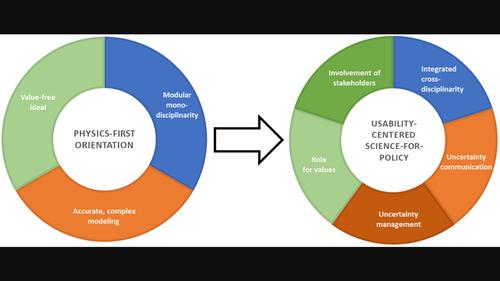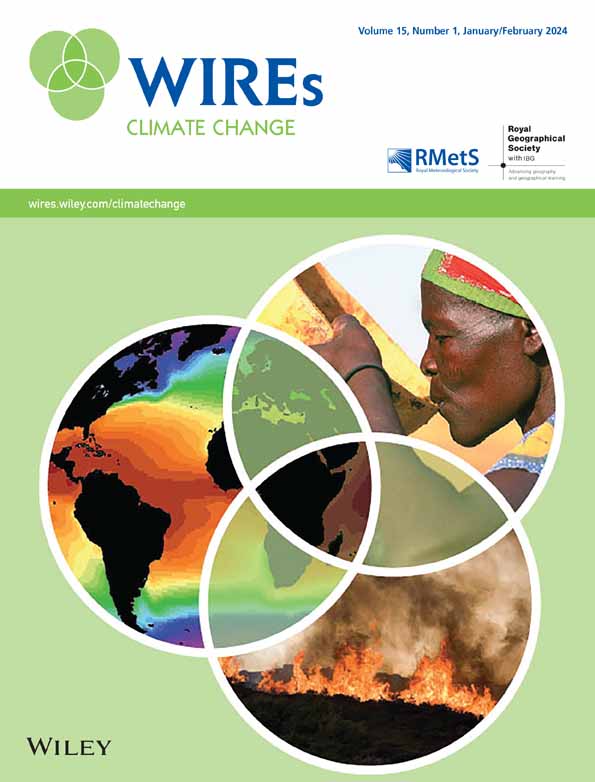Usability of climate information: Toward a new scientific framework
IF 10.3
1区 环境科学与生态学
Q1 ENVIRONMENTAL STUDIES
引用次数: 1
Abstract
Climate science is expected to provide usable information to policy‐makers, to support the resolution of climate change. The complex, multiply connected nature of climate change as a social problem is reviewed and contrasted with current modular and discipline‐bounded approaches in climate science. We argue that climate science retains much of its initial “physics‐first” orientation, and that it adheres to a problematic notion of objectivity as freedom from value judgments. Together, these undermine its ability to provide usable information. We develop the notion of usability using work from the literature on adaptation, but our argument applies to all of climate science. We illustrate the tension between usability and the objective, physics‐first orientation of climate science with an example about model development practices in climate science. For solutions, we draw on two frameworks for science which responds to societal challenges: post‐normal science and mandated science. We generate five recommendations for adapting the practice of climate science, to produce more usable information and thereby respond more directly to the social challenge of climate change. These are: (1) integrated cross‐disciplinarity, (2) wider involvement of stakeholders throughout the lifecycle of a climate study, (3) a new framing of the role of values in climate science, (4) new approaches to uncertainty management, and (5) new approaches to uncertainty communication.

气候信息的可用性:走向一个新的科学框架
气候科学有望为政策制定者提供有用的信息,以支持解决气候变化问题。回顾了气候变化作为一个社会问题的复杂性和多重联系性,并将其与当前气候科学中的模块化和学科限制方法进行了对比。我们认为,气候科学在很大程度上保留了其最初的“物理学优先”取向,并坚持一个有问题的概念,即客观性是不受价值判断的自由。这些因素共同削弱了它提供可用信息的能力。我们利用适应文献中的工作发展了可用性的概念,但我们的论点适用于所有气候科学。我们以气候科学中的模型开发实践为例,说明了可用性与气候科学的客观、物理优先方向之间的紧张关系。对于解决方案,我们借鉴了两个应对社会挑战的科学框架:后常态科学和强制科学。我们提出了五项建议,以调整气候科学的实践,产生更有用的信息,从而更直接地应对气候变化的社会挑战。这些是:(1)综合的跨学科性,(2)利益相关者在气候研究的整个生命周期中更广泛的参与,(3)价值观在气候科学中的作用的新框架,(4)不确定性管理的新方法,以及(5)不确定性沟通的新方法。
本文章由计算机程序翻译,如有差异,请以英文原文为准。
求助全文
约1分钟内获得全文
求助全文
来源期刊

Wiley Interdisciplinary Reviews: Climate Change
METEOROLOGY & ATMOSPHERIC SCIENCES-
CiteScore
20.00
自引率
2.20%
发文量
58
审稿时长
>12 weeks
期刊介绍:
WIREs Climate Change serves as a distinctive platform for delving into current and emerging knowledge across various disciplines contributing to the understanding of climate change. This includes environmental history, humanities, physical and life sciences, social sciences, engineering, and economics. Developed in association with the Royal Meteorological Society and the Royal Geographical Society (with IBG) in the UK, this publication acts as an encyclopedic reference for climate change scholarship and research, offering a forum to explore diverse perspectives on how climate change is comprehended, analyzed, and contested globally.
 求助内容:
求助内容: 应助结果提醒方式:
应助结果提醒方式:


